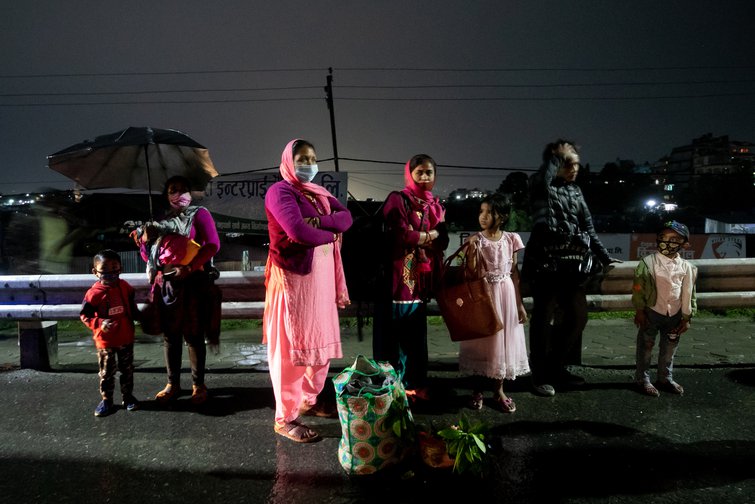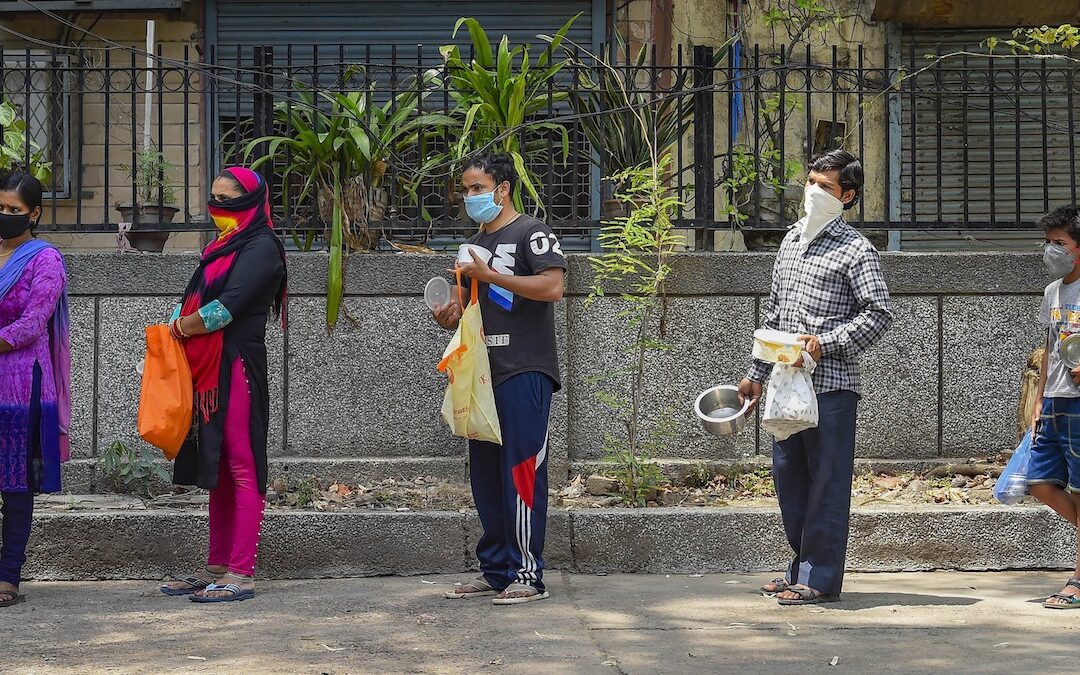
In solidarity with the stateless
The call stresses that stateless people who are denied and nationality and deprived of human rights and welfare are facing greater, life-threatening marginalization.

The call stresses that stateless people who are denied and nationality and deprived of human rights and welfare are facing greater, life-threatening marginalization.

The ICJ, together with 24 other civil society organizations, sent a joint open letter to the Indian Government calling for the release of human rights defenders, all detained under the Unlawful Activities (Prevention) Act (UAPA).
Mr Amit Shah
Union Home Minister of India
Ministry of Home Affairs
Government of India
Re: Release human rights defenders at risk in the context of COVID-19
Dear Home Minister,
We, the undersigned organizations, write with great concern regarding the situation of student activists Safoora Zargar, who is four months pregnant, Meeran Haider, Shifa-Ur-Rehman and Sharjeel Imam, all detained under the Unlawful Activities (Prevention) Act (UAPA). We believe their detention is unfounded and designed to punish them for defending human rights and engaging in peaceful protest against a discriminatory law. In addition, their being jailed in the context of the COVID-19 pandemic is unnecessarily putting their lives and health at serious risk. We urge you to immediately and unconditionally release all four activists, as well as other persons who have been detained, charged, or convicted simply for defending human rights and exercising their right to freedom of expression and peaceful assembly.
Safoora Zargar, Meeran Haider and Shifa-Ur-Rahman are student activists who were involved in protests against the Citizenship (Amendment) Act (CAA) and arrested in April 2020. Safoora Zargar, Meeran Haider and Shifa-Ur-Rahman, were arrested by the Delhi Police on 10 April, 1 April and 24 April on charges of rioting and unlawful assembly, reportedly in connection with their alleged role in the demonstrations.The CAA legitimises discrimination on the basis of religion and contravenes the Constitution of India and international human rights law. Student activist Sharjeel Imam was arrested in January 2020 under charges of sedition for his speech during anti-CAA protests. The additional charges under UAPA were brought in April 2020. All of them are currently in pre-trial detention.
Their situation is not unique. For example, on 14 April 2020, the authorities also detained human rights activists Anand Teltumbde and Gautam Navlakha under the UAPA for allegedly inciting caste-based violence during a 2018 demonstration in Bhima Koregaon, Maharashtra state. Nine other activists have been detained since 2018 in relation to the same case. They are known for their work defending the rights of Adivasi and Dalit communities and should all be released immediately.
We are seriously concerned that the Indian authorities have routinely misused draconian, anti-terrorism laws such as the UAPA, to undermine human rights, stifle dissent and press freedom. This is even more concerning during the COVID-19 pandemic. The slow investigative processes and extremely stringent bail provisions under these laws mean that human rights defenders and others who speak out may face many years behind bars unjustly. In their communication to the Government of India on 6 May 2020, eight UN Special Rapporteurs and the Working Group on Arbitrary Detention raised serious concerns about the 2019 amendment to the UAPA regarding ‘the designation of individuals as “terrorists” in the context of ongoing discrimination directed at religious and other minorities, human rights defenders and political dissidents, against whom the law has been used.’ They also noted that non-violent criticism of state policies or institutions should not be made a criminal offence under counter-terrorism measures in a society governed by the rule of law and abiding by human rights principles and obligations. Arrests of peaceful protesters violate India’s obligations under international law, specifically the International Covenant on Civil and Political Rights (ICCPR), to respect and protect the rights to liberty, to freedom of expression and peaceful assembly, set out in Articles 9, 19 and 21 of that treaty.
On 25 March 2020, the UN High Commissioner for Human Rights urged all states to release “every person detained without sufficient legal basis, including political prisoners, and those detained for critical, dissenting views” in response to the COVID-19 pandemic. With at least 200 prison inmates and jail staff testing positive for the COVID-19 across India, including in Maharashtra, Madhya Pradesh and Karnataka, when the authorities misuse draconian laws to detain activists and human rights defenders, including peaceful protesters, they are not only persecuting them, they are unnecessarily putting their lives at grave risk.
In addition, Safoora Zargar’s pregnancy makes her release even more urgent, particularly amid the COVID-19 pandemic. The United Nations Rules for the Treatment of Women Prisoners and Non-custodial Measures for Women Offenders, also known as the Bangkok Rules, recommend that while deciding on pre-trial measures, non-custodial alternatives should be preferred for pregnant women where possible and appropriate.
The Indian authorities need to ensure that, as they apply the Supreme Court of India’s directive to decongest prisons to contain the spread of COVID-19, they immediately and unconditionally release student activists Safoora Zargar, Meeran Haider, Shifa-Ur-Rehman and Sharjeel Imam who remain in jail simply for peacefully exercising their right to freedom of expression by opposing the discriminatory law. They should also immediately release the 11 rights activists and journalists jailed in the Bhima Koregaon case.
The fight against the pandemic must be inclusive and not selectively used to dissuade and prevent human rights defenders from exercising their human rights.
Download

The ICJ today denounced the decision on 5 May 2020 by the Philippines’ National Telecommunications Commission (NTC) to issue an order to ABS CBN Corporation, one of the leading media outlets in the country, to cease its on-air operations.
The ICJ asserted that the action against ABS CBN violates the right to freedom of opinion and expression, which includes the rights of the media to operate without censorship or restraint and the public’s right to access information. This right is guaranteed under Article 19 of the International Covenant on Civil and Poliitical Rights (ICCPR). The Philippines is a State Party to the ICCPR.
“A free and unhindered media is essential in any society to ensure freedom of opinion and expression and other human rights. It is one of the cornerstones of a democratic society,” said Emerlynne Gil, ICJ’s Senior International Legal Adviser.
The NTC’s basis for issuing the order is that ABS CBN’s legislative franchise has expired on 4 May 2020 and action has yet to be taken on its renewal by the House of Representatives. The ICJ fears that the reasons for this delay may be politically motivated.
Given the stakes for freedom of expression, the ICJ urges NTC to follow its own precedents whereby it has allowed broadcast and telecommunications companies to operate beyond their franchise expiry dates, pending the renewal.
“Limitations imposed on the right to freedom of opinion and expression have to pass the general tests, including that of necessity and proportionality, which do not appear to have been met here,” Gil added.
The action taken against ABS CBN is part of a pattern of harassment of independent media by governmental authorities in the Philippines. President Rodrigo Duterte has, in the past, expressed resentment towards ABS CBN for allegedly refusing to air his political ads when he ran for office in 2016. The network is also known to have aired views critical of his administration’s murderous ‘war on drugs’.
In December 2019, President Duterte said that he would make sure that ABS CBN’s franchise would not be renewed. This is not the first time that he has sought to silence a media outlet critical of his administration.
There are at least 11 bills seeking the renewal of the franchise currently pending at the House of Representatives, with the earliest filed in July 2019.
“It is taking the House of Representatives an inordinately long period of time to approve the renewal of ABS CBN’s franchise,” said Gil. “It appears that the allies of this administration in the House are holding the franchise renewal like a sword over ABS CBN’s head to chill it from airing critical views about the government.”
The UN Human Rights Committee, the ICCPR’s supervisory body, has said that States must avoid imposing onerous licensing conditions on broadcast media, and that the criteria for the application of these conditions should be reasonable, objective, clear, transparent, and non-discriminatory.
This action against ABS CBN comes in the middle of the state of public health emergency in the Philippines when access to information is vital in the country’s response to the COVID-19 crisis. The ICJ had earlier raised its concerns on abuses occurring during the lockdown in the Philippines.
The ICJ calls on the Philippine government to uphold and respect freedom of opinion and expression, and ensure that a free press can operate without censorship or restraint.
The ICJ also reminds the government that the public’s access to information is vital to ensure public health and safety during the COVID-19 crisis.
Contact
Emerlynne Gil, Senior International Legal Adviser, t: +662 619 8477 (ext. 206) or e: emerlynne.gil(a)icj.org

The Indian government has fallen short of its obligations to guarantee the right to housing during the COVID-19 pandemic, the ICJ said in a briefing paper released today.
Millions of people in India live in informal settlements with poor infrastructure and in overcrowded living conditions, which makes maintaining physical distance during the COVID-19 pandemic difficult, if not impossible. Internal migrant workers in particular have been stranded in informal settlements in urban locations far from their homes as has been previously highlighted by the ICJ. During most of the lockdown period from 22 March to 29 April, these workers could not travel home where they would have had easier access to food and other basic necessities. In a briefing paper on the Right to Food published on 27 April, the ICJ called on India to take immediate steps to guard against an impending “hunger crisis”.
Maitreyi Gupta, ICJ India International Legal Advisor says, “The right to housing and other human rights violations faced in particular by the poor due to the lockdown is massive. Its effects will be long-term. We urge the Government to take urgent steps to avert the housing crisis. The Government must prioritize housing with basic necessities in both rural areas and deprived urban areas. It must ensure basic necessities in quarantine facilities and shelter homes. Finally, the Government must guarantee that there are no undue restrictions on related human rights such as the right to movement and the right to livelihood among others.”
In a briefing paper, the ICJ answers the following questions in context of some of the human rights concerns that have arisen as a consequence of lack of access to adequate housing during the COVID-19 pandemic:
The ICJ calls upon India to undertake the following :-
Infographic
Download the Right to Housing Infographic here.
Contact
Download
India-Right-to-Housing-COVID19-Briefing-Paper-2020-ENG (PDF)

“Excessive restrictions on freedom of peaceful assembly in Kazakhstan have been of significant concern to the UN Human Rights Committee, the Venice Commission of the Council of Europe, and other human rights bodies for many years,” said Sarah Cleveland.
“Kazakhstan now has an important opportunity to bring its law into compliance with its international human rights obligations, but the draft law currently being considered does not achieve this.”
The Opinion finds that the proposed legislation includes of number of restrictions on freedom of assembly that are fundamentally contrary to Kazakhstan’s human rights obligations, including (1) excessive notification and approval requirements; (2) excessive authority to ban an assembly; (3) a prohibition on spontaneous assemblies; (4) restriction of assemblies to specific locations; (5) preferential treatment for assemblies organized by the government; (6) a prohibition against foreigners, refugees, stateless persons from organizing or participating in assemblies, (7) excessive obligations on organizers and participants; and (8) excessive sanctions for organizers and participants. The timing and process for adopting a law that so fundamentally impacts domestic compliance with core human rights obligations itself raises serious human rights concerns, given the limited ability of civil society organizations and the general public to participate in a robust public debate regarding the law during the quarantine.
In light of these serious human rights concerns, the IBAHRI, the ICJ and the CCPR Centre urge the Senate and/or the President of the Republic of Kazakhstan to halt consideration of the Draft Law, and to seek guidance from the OSCE/ODIHR Panel of Experts on Freedom of Assembly and Association, the Office of UN High Commissioner on Human Rights, and/or the Venice Commission regarding how the current law on freedom of peaceful assembly might be revised consistent with Kazakhstan’s international human rights obligations.
Kazakhstan-Assembly Law Opinion-Advocacy-2020-ENG (full text in PDF)